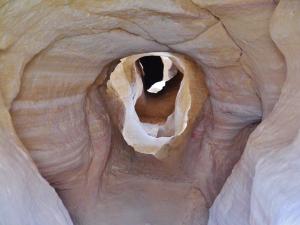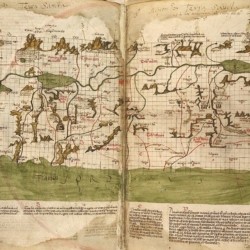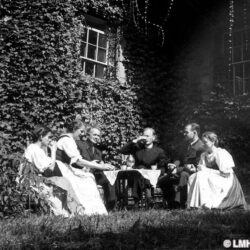DOWNLOAD:
This meditation is inspired, in part, by pieces written by Rabbi Steven Exler and Zoketsu Norman Fischer. It is also based on the teaching of the Ba’al Shem Tov, the founder of Ḥasidic Judaism, that “a person is a microcosm of the world, and they have inside them Pharaoh, Egypt and so on” (See Toldot Ya’akov Yosef on BeShalaḥ).
| Contribute a translation | Source (English) |
|---|---|
Make yourself comfortable, take a deep breath, and then let’s begin… | |
We were born into slavery. | |
Our parents were slaves, our grandparents were slaves. | |
All we can imagine is slavery; no other possibilities are present in our minds. We are subject to the will of our oppressors all day and all night. Our bodies, minds and spirits are broken from harsh labor and savage cruelty. | |
Our parents have told us a story, a story that seems so distant we think it must be about some other people. | |
It is a story about a people that came into being in relationship with the Infinite, and whose destiny is to live freely in a land they belong in. | |
But those lofty promises seem far removed and even fantastical. | |
We have been here so long, our oppression seems to us the way life was, is and will be. | |
As we have been oppressed, so we have multiplied, and so the Egyptians have come to fear and hate us more, culminating in Pharaoh’s order to murder our newborn sons. | |
Our situation is narrowing, constrained, in the metzarim, the narrow places, of Mitzrayim (the Hebrew word for Egypt). | |
This constriction removes our sense of self, of agency, choice and dignity. We feel it closing in on us, suffocating us. We are powerless, we are crushed, we are silenced, we are unable to even name or describe our reality. | |
When the book of Exodus (in Hebrew, ‘Shemot,’ meaning ‘Names’) begins, we are nameless, not even individuals any more. | |
And time also has no shape or meaning. | |
The days, months and years are not marked in any way; they simply stream into one another. Until, many years later, something eventually changes. Something outside of ourselves – the death of Pharaoh, our oppressor – reminds us that life does not always just stay the same. | |
Pharaoh, revered as a god, whose will touches every Egyptian, is suddenly gone. | |
Everyone and everything in Egypt dramatically changes their routine to mark this colossal shift in paradigm. | |
We hate and fear Pharaoh, but we had partially bought into the culture that treated him like a god. We are shocked, amazed, scared about what may follow. We may even feel some compassion for him or other Egyptians, as the oppressed often do for their oppressors. | |
All of this raw emotion and confusion opens us up to new possibilities. The death of Pharaoh introduces the possibility of change into our lives. It reminds us that our slavery is not the only possible scenario. We are no longer numbed into the passive dumbness of total submission. | |
We can now permit ourselves to see more deeply than before the truth of our situation, how unbearably painful it is. | |
We permit ourselves to cry. We sigh. We cry out. | |
And the cry becomes a prayer, ascending to the Infinite and arousing compassion for our plight. This is our first moment of expression, of beginning to name our reality – at first with a pre-verbal sigh and moan and cry – but then eventually this evolves into words and actions, into telling and living our own story. “It was many years later; the king of Egypt died. The children of Israel groaned from the bondage, and they cried out; and their plea for help from the bondage went up to G!d. G!d listened to their moaning, and remembered his covenant with Abraham, with Isaac and with Jacob. G!d saw the children of Israel, and G!d knew.” (Exodus 2:23-25). | |
Our people’s cry is a human awakening that changes G!d; it wakes up the Infinite. G!d listens, G!d remembers, G!d sees, G!d knows. What awakens the Infinite is not a complaint or even a call for revenge. | |
It is our deeper consciousness of our true situation, an awareness that we had previously let go of in our enslavement. | |
We are beginning to retake control of our thoughts, of how we look at ourselves, and at life. We are, for the first time, acknowledging the depth of our suffering, and crying out. But it does not end there. | |
As we let ourselves awaken to the truth of our life as it really is, we enter into responsive relationship with life, with the Infinite. | |
Immediately after we cry out, and the Infinite responds, the Torah describes Moses’ encounter with the Infinite at the burning bush, where he is given the mission of liberating us. | |
And so we watch in shock as Moses gathers our elders, performs miraculous signs and promises our deliverance. | |
We dare not to hope too much, and we are not surprised when Moses’ initial efforts backfire and our suffering only increases. | |
Such is the initial pain of increased consciousness and awareness. | |
We now know how bad our situation is, and it only seems to be getting worse. | |
Then we watch, aghast, as Moses and Aaron bring terrible plagues on the Egyptians. Plague after plague. We are terrified! | |
Every time, they undermine what we thought was the iron grip of our masters on us, on the world around us, on the land we live on, the water we drink, the air we breathe. | |
Every time, we do not know how they will affect us. Every time, we fear for our own lives, for our own families, for those Egyptians we may have some empathy and compassion for. | |
Every time, we are shocked by the miraculous differentiation that happens, between us and the Egyptians, between our land and their’s. | |
We thought that we were a permanent part of Egypt, we have been here so long. | |
But now we are gradually re-membering, re-learning, what it means to have our own identity, our own story, our own destiny. | |
Through these terrifying plagues, we learn of the awesome power of G!d, of the awful and awe-full consequences of human actions, and of our distinctiveness. | |
We have never marked time for ourselves, but now we are being told to count until the tenth day after the new moon and then to take a lamb – an Egyptian god – and brazenly tie it up, and then kill it. | |
Moses tells us to eat its flesh and smear its blood on our doorposts. | |
He tells us that the Infinite will smite our oppressors and that we will be spared, protected by the blood, and that we will leave Egypt in haste. | |
And so it happens… We count the days. We take the god of our oppressors. We tie it up. We kill it and eat it, and we smear its blood on our doorposts. The Egyptians are struck, and they cry out in suffering. We are spared, protected by the blood. | |
All of us – the Egyptians, Pharaoh, us – come face to face with the simple, profound reality of life and death, of the consequences of our actions. | |
In this one night, the world changes beyond recognition. | |
The oppressors are stunned into submission, revealing their vulnerability, while we, the oppressed slaves, are suddenly carried by hope to an uncertain future. | |
We are being urged by the Egyptians to leave as quickly as possible. We find ourselves suddenly free, free to pack up our not-yet-risen dough-cakes, and walk out of our slave-homes, through the bloody doorposts and into the boundless possibilities of freedom. | |
We are free. | |
It could only happen because we allowed ourselves be awoken, to cry out, to become conscious of our reality, and then to take control over our destiny. | |
We are being reborn through the birth canal of the splitting sea. We are reentering the flow of life. We are remembering how to sing. | |
We are learning once again to make our own choices, how to change and grow, to learn from our mistakes. | |
We are learning once again what it is to be truly free, truly ourselves, truly alive. |
Postscript: Questions to Consider
- What is the liberation I am needing right now?
- Freedom from what?
- Freedom towards what?
- How have I best made progress in this journey of liberation until now?
- How might I best progress with this journey of liberation going forward from this moment?
Source


“A Guided Meditation for Pesaḥ, by Rabbi Daniel Raphael Silverstein” is shared through the Open Siddur Project with a Creative Commons Attribution-ShareAlike 4.0 International copyleft license.










Leave a Reply